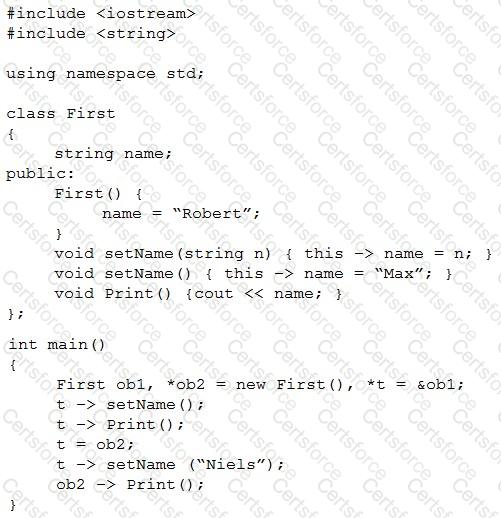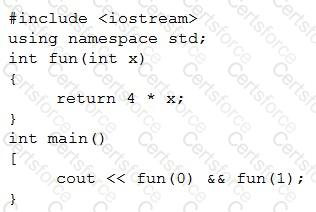Which of the following is a user defined data type?
1:
struct person
{
char name[20];
int age;
};
2:
int l=2;
3:
enum color {red,blue, green};
D.
char c;
What happens when you attempt to compile and run the following code?
#include
using namespace std;
int main()
{
long int x,y=10;
double d;
d = 3.99;
x=(int) d;
cout << x <<", ";
d=float (y);
cout << d;
return 0;
}
What happens when you attempt to compile and run the following code?
#include
using namespace std;
int fun(int x) {
return 2*x;
}
int main(){
int i;
i = fun(1) || fun(2);
cout << i;
return 0;
}
What happens when you attempt to compile and run the following code?

Which of the following expressions decrement variable i by 2? (Choose two.)
What is the output of the program?
#include
#include
using namespace std;
struct t
{
int tab[2];
};
class First
{
struct t u;
public:
First() {
u.tab[0] = 1;
u.tab[1] = 0;
}
void Print(){
cout << u.tab[0] << " " << u.tab[1];
}
};
int main()
{
First t;
t.Print();
}
What is the output of the program?
#include
using namespace std;
class BaseC
{
int i;
public:
BaseC() { i=?1;}
BaseC(int i) { i=i; }
void seti(int a) { i = a; };
void Print() { cout << i; }
};
int main()
{
BaseC *o = new BaseC();
o?>seti(10);
o?>Print();
}
Which code, inserted at line 8, generates the output "100"?
#include
using namespace std;
int fun(int);
int main()
{
int *x = new int;
*x=10;
//insert code here
return 0;
}
int fun(int i)
{
return i*i;
}
What happens when you attempt to compile and run the following code?

What happens when you attempt to compile and run the following code?
#include
using namespace std;
int main()
{
int i=2;
switch(i)
{
case 1:
cout<<"Hello";
case 2:
cout<<"world";
case 3:
cout<<"End";
} return 0;
}